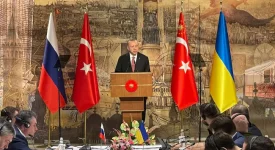Carl Bildt (European Council on Foreign Relations)
Throughout its entire existence, Istanbul, a city on the banks of the Bosphorus Strait separating Europe from Asia, has been the focus point of the relations between the West and the East. It will very likely retain this role as the relationship between the Christian Europe and the vast Muslim world is gaining significance. The Turkish political life has always been stormy and marked by conflicting visions or aspirations, achievements and obstacles. Nonetheless, during the last two centuries, Turkish reformers have looked up to Europe as the main source of inspiration.
The first Turkish president, Mustafa Kemal Atatürk, drew on this tradition and today he is followed by President Recep Tayyip Erdogan, who has managed to become a formidable personality in world affairs over the past 13 years. However, the negative attitude of some states regarding Turkey’s membership in the European Union was disappointing for many Turks. This has caused a division in the society, which feels rejected by Europe that it uses as a kind of reference point.
Moreover, since 2013 the society has led a silent war between Erdogan’s Justice and Development Party and its former allies, the Gülen movement and the Islamic community, led by the preacher in exile Fethullah Gülen. This silent war revealed itself to the world back in July, when a failed coup attempt took place, which was, according to many, staged by the followers of the Gülen movement. Had the coup been successful, Turkey would have been plunged into a civil war with no good prospects for its end and the democratic hopes would have vanished. However, every cloud has a silver lining and the coup attempt has also brought about the unification of the hitherto divided democratic political parties.
However, the lack of the West’s empathy in these difficult times is astonishing for the Turks. It cannot be in the interest of any Western country that the Russian president was the first to meet Erdogan after such dramatic events had taken place. Nobody should be surprised that Turkey is trying to remove the Gülenists from their positions of power – every country facing an internal uprising would have done the same. Turkey is now at a historic crossroads, but it is still too early to say where it is heading. If the previous trends of polarization and authoritarian-ism prevail, this will only have dire consequences for the country, but if national unity based on democratic principles prevails, this could lead to improvements in the political climate in Turkey.







